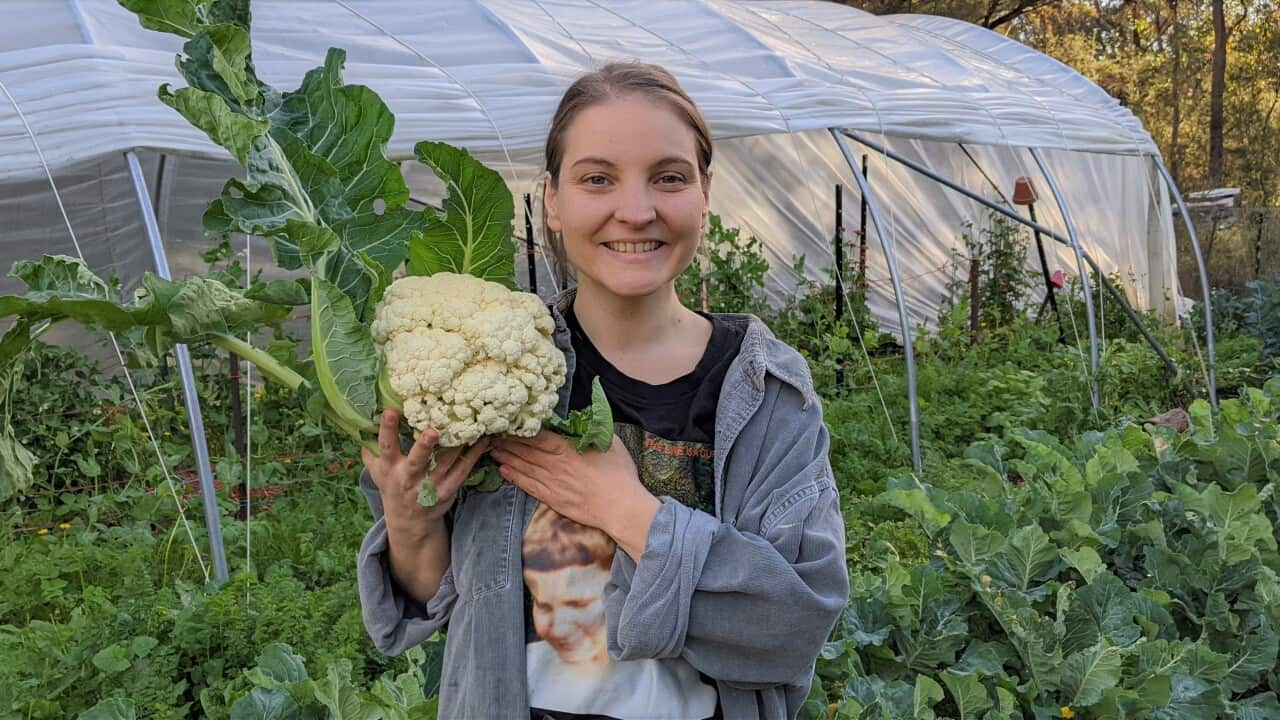On a crisp winter morning in the Blue Mountains, a 90-minute drive west of Sydney, Manu Prigioni is taking a break from tending vegetables.
The winter harvest includes cauliflower, broccoli, kale, radishes, snow peas, sugar snaps and lettuce, all cultivated by local volunteers.
"It is a brilliant way to connect people socially around food growing," Prigioni, 38, says.
"And the people who come are vastly different ages and cultural backgrounds."

Volunteers at work on a garden plot in the Bue Mountains. Source: SBS News / Sophie Bennett
"The main aim is to bring food production back into our cities, towns and suburbs," she says.
However, it has a broader purpose, too. Prigioni wants to turn unused land into regenerative market gardens, at the same time connecting people who are lonely.

Blue Mountains landowner Sylvia May, 79, (right) with Manu Prigioni. Source: Supplied
Among them is 79-year-old former nurse, Sylvia May.
"I am on a big bush block, and many of my friends were retiring and downsizing. But I prefer to stay here on my land," May says.
"Without Farm it Forward, most of my social contact would be with people my own age. Now, I am mixing with people of different ages, which helps me feel like myself, not an old person.
"Plus, having a vegetable garden on site where I don't have to do the work myself, that is the most amazing luxury."

Manu Prigioni (centre) with a team of volunteers. Source: SBS News / Sophie Bennett
Landowners like May get free food, and the rest is sold directly to the community, which helps to pay young people to tend to the market gardens.
It's a win-win scheme with other health benefits.
New research published in the journal by Harbin Medical University in China, examined links between loneliness, social isolation and early death among more than 2 million adults.
The study found that people who experienced social isolation had a 32 per cent higher risk of dying early from any cause.

Dr Grant Blashki is a lead clinical adviser for Beyond Blue. Source: Twitter / Grant Blashski
Can chronic loneliness lead to health issues?
Dr Grant Blashki is the lead clinical adviser of the mental health service Beyond Blue. As a GP, he says chronic loneliness is linked with other health issues, too.
"The studies tell us that loneliness is associated with a 30 per cent rise in heart disease and a 30 per cent rise in strokes, as well as premature death," Blashki says.
"That is right up there with smoking, obesity and physical inactivity. So, we think it's a really legitimate and important public health issue."
Prigioni started Farm it Forward following her own mental health struggles.

Manu Prigioni at her tiny house in the mountains. Source: SBS News / Sophie Bennett
"I had a really hard time when I first moved to the mountains, I was very socially isolated for sure," she says.
"Then I had a pretty strong episode of post-natal depression. But my clinical psychologist happened to be an amazing gardener."
Under her psychologist's guidance, Prigioni started growing food and developed a passion for permaculture. That connected her to other like-minded people.
Farm it Forward followed in 2019. Volunteers now tend eight different plots in the mountains, while working to break down social barriers.

A Farm it Forward volunteer planting vegetables. Source: SBS News / Sophie Bennett
Loneliness, on the other hand, is an emotional state in response to having a lower level of social contact than desired.
While most people will experience loneliness at some point in their lives, those experiencing chronic loneliness, which extends over years, are most at risk of health impacts.
Blashki says community projects like this are increasingly seen as one solution, by the medical profession.
"Doctors are actually being encouraged to provide what we call 'social prescriptions'," he says.
"That means, I write down on a piece of paper, like a script, a suggestion that patients join communities."
Blashki says social isolation peaked during COVID-19 pandemic lockdowns, but many people are still struggling to reconnect.
'Social prescribing' has been adopted into healthcare systems overseas. It was first integrated into national health policy in England, in 2019.
Dr Rosanne Freak-Poli, a life-course epidemiologist from Monash University, says Australia is lagging behind.
Without a clear pathway to joining community projects like Farm It Forward, such as through health professionals, she says isolated people can be reluctant to reach out.
"The biggest barrier is actually putting yourself out there and talking to new people," she says.
"And we all have to do it in our lives because research shows that every seven years, we change, and our friends change. So that's important to keep in mind."
Volunteer Rafida is proud to cook meals with Farm it Forward, using unsold produce to make healthy and affordable meals.
"For me, cooking is my way of sharing with the community, and I love it," she says.
As living costs continue to rise, Blashki says projects like Farm It Forward have the potential to create broader social change.
"We are in the midst of a societal transformation where we're trying to deal with some really urgent environmental issues," he says.
"Part of that solution is going to be growing and consuming local foods. Not everything needs to be bought from the other side of the world and flown over on a plane or brought over on a ship.
"There's a confluence of mental health, environmental, and social capital agendas that make projects like this most worthwhile."

Volunteers gather to eat lunch together. Source: SBS News / Sophie Bennett
"I'd like to see this type of initiative in each local area, if not in each suburb," she says.
"It's incredible in terms of nipping public health issues in the bud, and it is strong in its small and meaningful scale.
"So, lots and lots of small and meaningful makes really, really powerful change."









